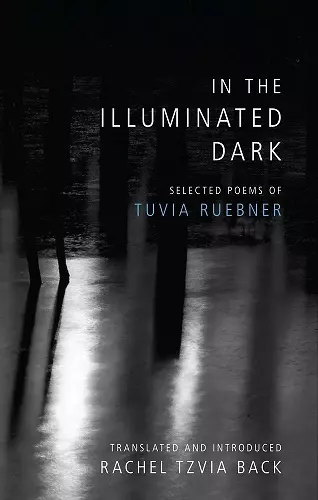In the Illuminated Dark
Selected Poems of Tuvia Ruebner
Tuvia Ruebner author Rachel Tzvia Back translator
Format:Hardback
Publisher:Hebrew Union College Press,U.S.
Published:30th Jun '14
Currently unavailable, and unfortunately no date known when it will be back

Loss defines the crossbeams and chronicles of Tuvia Ruebner’s life. Born in 1924 into a semi-secular Jewish family in Slovakia, Ruebner was also born into the catastrophe that would follow - the extermination of European Jewry and of his own family in the Holocaust. Hitler became chancellor of Germany on Ruebner’s ninth birthday. Six years later, the race-laws enacted in Slovakia banned all Jewish students from school and Ruebner’s formal education ended with ninth grade. His involvement in the Socialist-Zionist youth movement bought him a ticket out to Palestine and, in 1941, the seventeen-year-old bid his family farewell at the Pressburg-Bratislava train station, unaware that he would never see them again.
The disasters of the twentieth century swept Ruebner from Europe to Israel, from German to Hebrew, from the familiar to the strange. Despite his truncated formal education, he became a poet and man of letters in Israel’s fledgling intellectual community alongside other Jewish immigrant-refugee-survivors like Ludwig Strauss, Werner Kraft, Lea Goldberg and Dan Pagis, eventually gaining international esteem as professor of comparative literatures at Haifa University and as translator of Nobel prize winner S.Y.Agnon’s stories into German. Ruebner’s early work in Israel took shape in German, the language he spoke to his lost beloveds and the language of Kafka, Hoelderlin and Rilke, whose work he loved, a language that protected him from the overwhelming strangeness of his new land and life. He began composing poetry in Hebrew in the 1950s, beginning a life-long relationship with the newly-revived ancient tongue. The result: fifteen poetry collections in Hebrew, from The Fire in the Stone in 1957 to Last Ones in 2013, a poetic oeuvre that has received countless awards and accolades in Israel and Europe alike and has established Ruebner as an elder of the tribe.
Ruebner’s poetry offers us an exquisite and indispensable voice of the twentieth century. His little sister, murdered in Auschwitz, and his youngest son, who disappeared in South America, wander unceasingly through his poems. Beyond the personal losses, the devastation of the century informs all of his work. Textual rupture and fragmentation echo historical rupture and fragmentation. The wonder of Tuvia Ruebner is that, after a lifetime of loss and tragedies, he remains open to the possibility of happiness....
There is suffering and rage, disappointment and regret in Tuvia Ruebner's late poems written at the threshold of death, but there is also something else, something moving and unexpected-a deep and abiding sense of wonder and amazement. These last poems, excellently translated by Rachel Tzvia Black, face the world with a marvelous feeling of awe.
Edward Hirsch
"Rachel Tzvia Back's wise and attentive translations of Tuvia Ruebner's late poems present us with a poet as curious and contemporary in his nineties as in his earlier work. In these poems, death is an approaching horizon, but Ruebner's present carries far more than the memories and ghosts of his past. For Ruebner, the present is time that must not be taken for granted, a deep well from which he draws his dynamic poetry of desire, inquiry, and critique. "How many nearing ninety still write/ love poems?" he writes in a poem that-filling the page before us-answers its own question."
Adriana X. Jacobs
- Commended for National Jewish Book Award (Poetry) 2015
ISBN: 9780878202553
Dimensions: unknown
Weight: unknown
400 pages